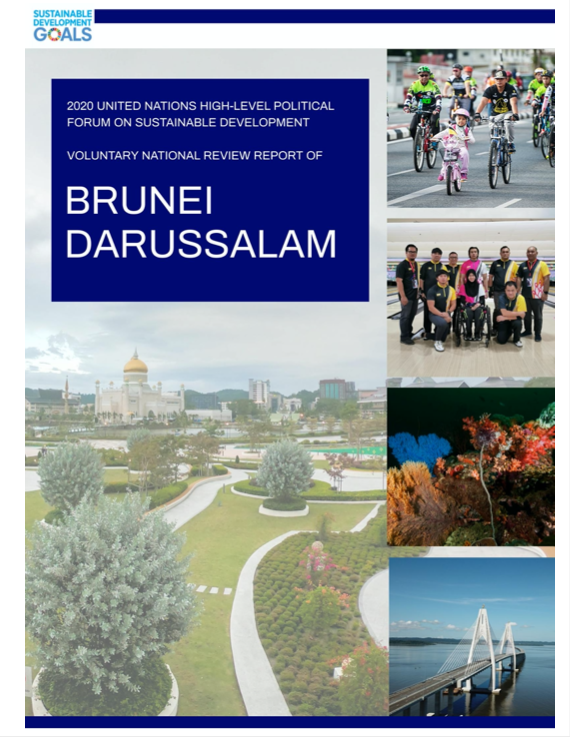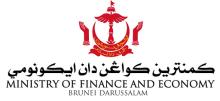Resource information
© Ministry of Finance and Economy, Government of Brunei Darussalam 2020.
Brunei Darussalam strives to build on its Millennium Development Goals achievements to take greater strides towards the 2030 Agenda for Sustainable Development and the Sustainable Development Goals (SDGs).
The 2030 Agenda complements Brunei Darussalam’s national vision, Wawasan Brunei 2035, which aims to achieve a population with high quality of life and build a dynamic and sustainable economy with an educated, highly skilled and accomplished work force by 2035. The country’s nation building efforts are supported by a strong sense of community spirit and high regard for family values, whilst upholding the country’s rich traditions and cultures. The Government makes it a priority to continue in guaranteeing the welfare of the people at all levels, thus ensuring that no one is left behind.
Our Voluntary National Review (VNR) outlined our SDGs journey, challenges and accomplishments thus far and the further progress that we aspire to achieve. In preparation for the VNR, an interministerial Special Committee spearheaded by the Ministry of Finance and Economy and the Ministry of Foreign Affairs was established, comprising of relevant Government Ministries, with active engagement with relevant stakeholders, including non-government organisations and civil societies. These inclusive and transparent engagements ensure greater awareness and ownership of the report which truly reflects a holistic and comprehensive perspective of our SDGs efforts. The VNR also provided an opportunity to review our strategies, policies and institutional mechanisms and identify the implementation gaps.
Today, Brunei Darussalam enjoys one of the highest standards of living in Asia where its people continue to prosper and live in a safe, and harmonious environment, with access to universal healthcare, quality education and infrastructure. The education and health standards in Brunei Darussalam are amongst the highest in the developing countries. The high level of enrolment contributed to the high literacy rate of over 95%.
Brunei Darussalam has been certified free from infectious diseases namely polio, malaria, measles and recently rubella; low maternal mortality rates; and has achieved the SDG targets for neonatal and child mortality rates. 100% of the population has access to clean drinking water, while 92% enjoy access to improved sanitation systems.
Brunei Darussalam is continuously providing affordable and sustainable housing, as well as adequate financial support for the poor, elderly, and differently-abled persons. It has made significant progress in deepening connectivity, both physical and virtual, where 97.54% of the country is connected by roads, and mobile penetration has consistently exceeded 100% since 2012.
The World Economic Forum recognises Brunei Darussalam’s significant progress towards gender equality in key areas such as education, health and economic participation. Brunei Darussalam ranks highly in girls’ enrolment in secondary and tertiary education, wage equality for similar work and for employing women legislators, senior officials and managers. Brunei Darussalam is proud to be among carbon neutral countries and the Brunei National Climate Policy aims to make further progress in safeguarding its environment and natural resources.
Our country’s resilience and unity are best observed in our rapid response to the COVID-19 pandemic which significantly contained the outbreak. The Government has mobilised resources to ensure adequate capacity of the health system, including by establishing quarantine centres and building a new virology laboratory. To mitigate the negative impacts to businesses, employment and to ensure swift economic recovery post COVID-19, the Government intervened with tax allowances, deferment of payments of loans, and re-skilling and up-skilling for affected workers. The education institutions too swiftly responded by retrofitting to home online-learning.
Brunei Darussalam appreciates the importance of global partnership to successfully achieve the 2030 Agenda. Therefore, the country welcomes technical assistance and capacity building programmes towards strengthening its capacity and will continue to support efforts of regional and international organisations particularly the work of the ASEAN Centre for Sustainable Development Studies and Dialogue, the Commonwealth and the United Nations.
Brunei Darussalam’s VNR report reflects the country’s commitment towards the 2030 Agenda. The challenge now is to make, sustain and monitor further progress and ensure that achievements are inclusive and all encompassing. The VNR also serves as a reminder that Brunei Darussalam has to not only continue but further deepen its efforts, as a country and as a partner in the global community, towards a sustainable future for all.


